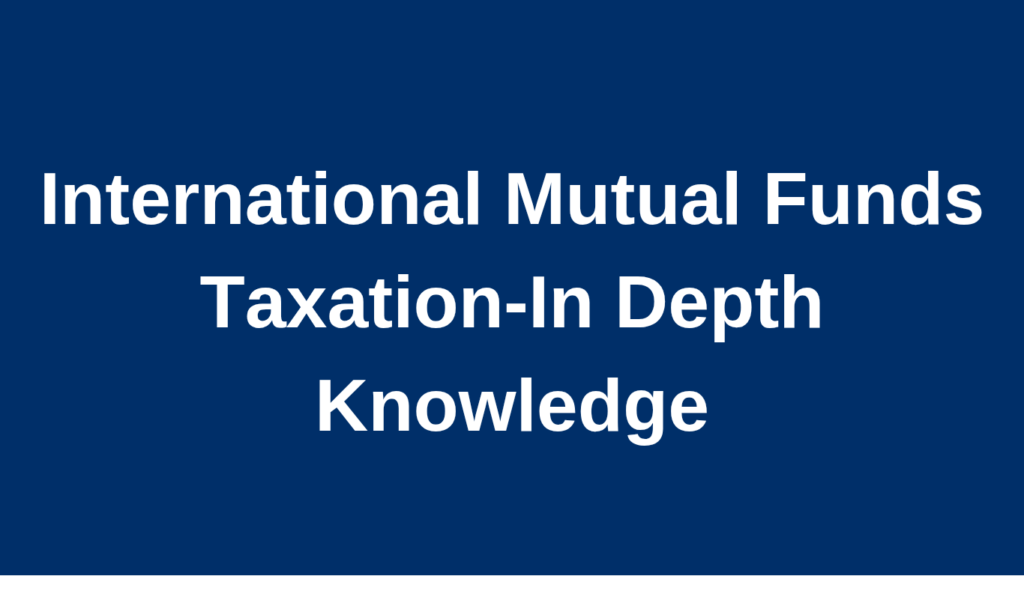International Mutual Funds Taxation-In Depth Knowledge

Quick Overview
Here we provide in-depth look at the taxation of international mutual funds, emphasizing the importance of understanding tax implications for investors. It discusses various aspects of taxation, including capital gains, dividend distribution, and the impact of Double Taxation Avoidance Agreements (DTAA). By shedding light on these factors, the article aims to help investors make informed decisions regarding their investments in international funds.
Key Points
- Understanding Taxation on International Mutual Funds: Investors need to be aware of how international mutual funds are taxed, which can differ significantly from domestic funds.
- Types of Capital Gains: The article distinguishes between short-term and long-term capital gains, explaining their respective tax rates.
- Dividend Taxation: It discusses how dividends from international funds are taxed in the hands of investors and the implications of withholding tax.
- Double Taxation Avoidance Agreements (DTAA): The role of DTAA in mitigating tax burdens for investors is highlighted, showcasing its importance in international investments.
- Investment Strategy Considerations: The article advises on strategic planning for tax efficiency when investing in international mutual funds.
Detailed Breakdown
Understanding Taxation on International Mutual Funds
Investing in international mutual funds can offer diversification and growth potential, but it also comes with unique tax considerations. Unlike domestic funds, international investments may be subject to different tax rates and regulations. Investors must familiarize themselves with these rules to avoid unexpected tax liabilities.
Types of Capital Gains
Capital gains from selling mutual fund units can be classified as either short-term or long-term.
- Short-term capital gains (for units held for less than three years) are taxed at a higher rate, typically aligned with the investor’s income tax slab.
- Long-term capital gains (for units held for more than three years) benefit from a lower tax rate, currently set at 20% after indexation benefits. This distinction is crucial for investors when planning their exit strategies from investments.
Dividend Taxation
Dividends received from international mutual funds are subject to taxation. When these funds distribute dividends, they may incur a withholding tax in the country of origin, which can range from 15% to 40%. Investors must account for this tax when calculating their net returns. Furthermore, dividends are also taxed in India, which can lead to double taxation unless mitigated by DTAA.
Double Taxation Avoidance Agreements (DTAA)
DTAA plays a pivotal role in reducing the tax burden on international investments. These agreements between India and various countries allow investors to claim tax credits for taxes paid abroad, thus preventing double taxation. Understanding the specifics of DTAA is essential for investors to optimize their tax liabilities and enhance their overall returns.
Investment Strategy Considerations
The article emphasizes the need for a strategic approach to investing in international mutual funds. Investors should consider the tax implications when selecting funds and planning their investment horizon. Utilizing tax-efficient strategies can significantly enhance the after-tax returns of international investments.
Important Details & Evidence
- The tax rates for capital gains can vary significantly based on the holding period, making it essential for investors to strategize their selling points.
- The withholding tax on dividends can significantly affect the overall yield from international funds, necessitating a thorough analysis of the fund’s structure and tax implications.
- The DTAA can provide substantial tax relief; for example, if an investor pays 15% withholding tax in the U.S. and there is a DTAA with India, they might only pay the difference in India.
Final Takeaways
Investing in international mutual funds can be rewarding but comes with complex tax implications that investors must navigate. Understanding the distinctions between short-term and long-term capital gains, the impact of dividend taxation, and the benefits of DTAA can empower investors to make informed decisions. By strategically planning their investments, investors can optimize their tax liabilities and enhance their overall investment experience.